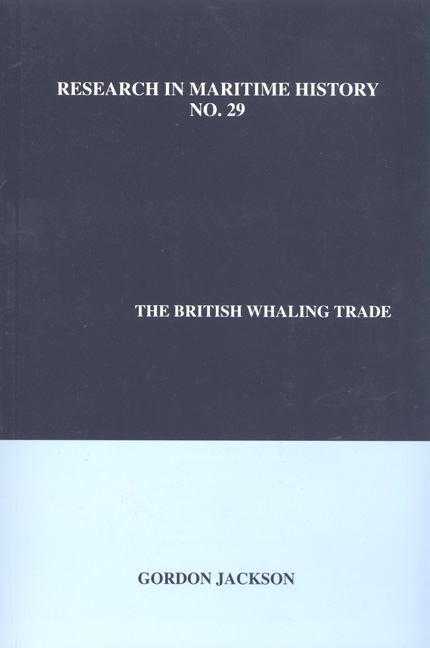Book contents
- Frontmatter
- Dedication
- Contents
- List of Tables in the Text
- List of Appendices
- New Introduction
- Preface
- Part One The Traditional Whaling Trades, 1604-1914
- Part Two The Modern Whaling Trade, 1904-1963
- Chapter 9 New Whaling Techniques
- Chapter 10 New Whaling Areas
- Chapter 11 Advances in Oil Technology
- Chapter 12 Expanding Fleets and the New Fishing Grounds, 1919-1920
- Chapter 13 Crisis and Contraction, 1929-1932
- Chapter 14 Regulated Recklessness, 1932-1939
- Chapter 15 The Final Fling, 1945-1963
- Conclusion
- Appendices
- Select Bibliography
- Additional Bibliography
- Index
Chapter 12 - Expanding Fleets and the New Fishing Grounds, 1919-1920
from Part Two - The Modern Whaling Trade, 1904-1963
- Frontmatter
- Dedication
- Contents
- List of Tables in the Text
- List of Appendices
- New Introduction
- Preface
- Part One The Traditional Whaling Trades, 1604-1914
- Part Two The Modern Whaling Trade, 1904-1963
- Chapter 9 New Whaling Techniques
- Chapter 10 New Whaling Areas
- Chapter 11 Advances in Oil Technology
- Chapter 12 Expanding Fleets and the New Fishing Grounds, 1919-1920
- Chapter 13 Crisis and Contraction, 1929-1932
- Chapter 14 Regulated Recklessness, 1932-1939
- Chapter 15 The Final Fling, 1945-1963
- Conclusion
- Appendices
- Select Bibliography
- Additional Bibliography
- Index
Summary
British whaling in the internar period cannot be understood, or adequately described, in terms solely of national production or national consumption. The continuation of Anglo-Norwegian rivalry ensured the international nature of the industry, in which the desire to maximise profits under a system of very free competition led to most complicated investment decisions based on factors that were very largely beyond the control of the British firms, or indeed, of any firm. There had always been international competition in whaling, but never before had individual firms produced so much, or had so much capital at stake. The balancing of supply and demand in the producers’ favour was by no means easy, and, as with other primary producers, whaler-owners were already moving dangerously close to over-production. At the same time the acceleration of technical change during the war ensured an international market for oil among soap and margarine producers, with the result that purely national needs had little effect on prices. Although British firms served their domestic market more than any other, the returns on their effort might be determined by marginal production in Norway or government purchasing policy in Germany. On the production side it will be necessary from time to time to set British whaling in the context of total whaling activity as recorded in the International Whaling Statistics compiled at the instigation of the Norwegian government. On the consumption side the historian is fortunate that the international market was increasingly dominated by one massive consumer - Lever Brothers/Unilever - whose needs and purchasing motivations are a good guide through the complexities of market forces between the wars.
It is worth pausing to consider aspects of the whale oil market between the wars which help to explain, if not justify, some of the difficulties eventually faced by whaling companies. Because of the precise seasonal nature of the trade, whale oil was unique in being possibly the only raw material - and certainly the only oil - of which the annual production come to market at one time. For the major consumers this had the advantage of enabling them to buy a year's supply within a brief period if they wished, so that any firm that could afford the very considerable inventory cost involved could secure its raw material against its rivals.
- Type
- Chapter
- Information
- The British Whaling Trade , pp. 169 - 184Publisher: Liverpool University PressPrint publication year: 2004



